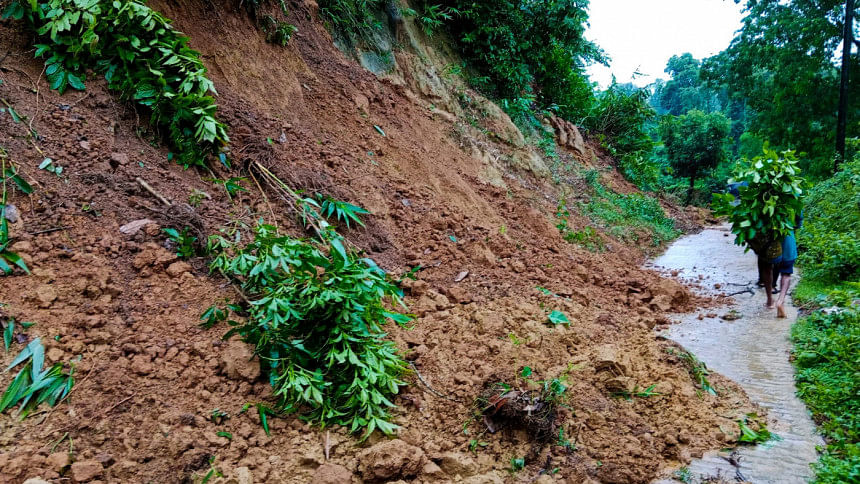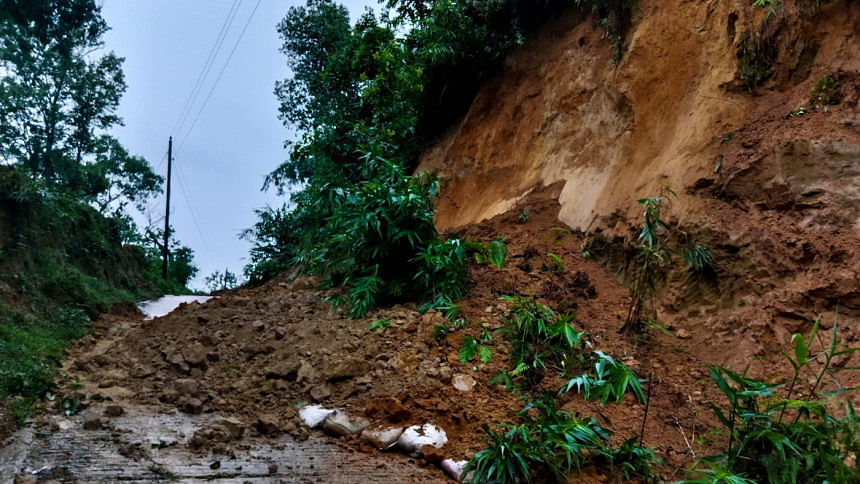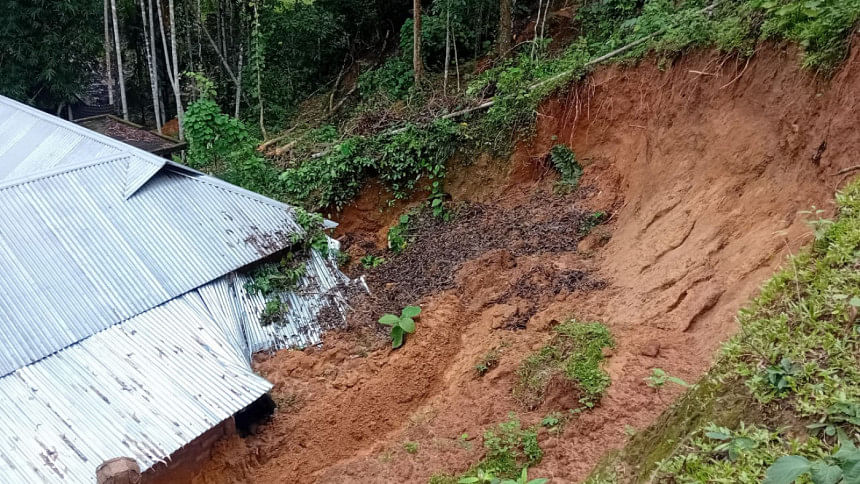Landslide fears add to flood woes in Sylhet region

Suleman Ali, a resident of Dahpara village in Moulvibazar's Juri upazila, says his house, located at the bottom of a hill, was recently damaged by a mudslide. He is now worried that the hill, pounded by heavy downpours for the past several days, may give way and collapse onto his house at any moment.
"My family and I are living in constant fear."
Suleman's plight is shared by tens of thousands who live near the foot of hills under the Sylhet division.

The heavy downpour has raised the risk of landslides in hilly areas. With more rain expected in the coming days, authorities have urged residents to move away from landslide-prone areas.
BMD today issued a forecast predicting heavy rainfall throughout the country, including the Sylhet region, over the next five days.
Because the hills have already been saturated with rain, local officials warn that additional rain could cause more landslides.
On June 18, a hill collapse caused by torrential rain and hilly torrents blocked traffic on Nirala Punji road in Sreemangal upazila.
Saju Marchiang, publication secretary at the Khasi Welfare Association, said vehicular movement on the road had yet to resume.
On May 31, a female tea worker named Gita Kahar, 30, was killed and three others were injured in a landslide in Kamalganj upazila.

"A mudslide struck them on their way to work," said Abdal Hossain, chairman of Adampur Union Parishad.
Tofazzal Sohel, coordinator of Habiganj Sankhubdo Andolon, explained how landslides occurred.
"Rainwater loosens the topsoil of hills. As the hills absorb water, the soil turns to mud, and the top part of the hills gets heavy. When the steep slopes can't support the weight anymore, landslides are triggered," he said.
Barlekha Upazila Nirbahi Officer (UNO) Najratun Naeem said announcements are being made on behalf of the upazila administration to ask residents living in the foothills to move to a safer place.
However, many have no option but to stay.
"My family knows about the risks. Although we are afraid, we have no other place to go," said Jasim Uddin, 35, who live on a hill slope in Saheb Tila village of Rajnagor upazila.
Abdul Karim Kim, general secretary of the Bangladesh Poribesh Andolon (BAPA), Sylhet chapter, said, "Sylhet has experienced four floods in 20 days. On June 10, three members of a family died when a landslide buried their house in Majortila's Chamelibag."
Kim blamed illegal hill-cutting for the landslides. "Hills are being razed and more and more temporary houses are being built to rent to poor people. It's a vicious cycle: more people in the hills means more hill-cutting and more landslides."
Accusing the local administration of inaction, he said this was happening under their noses.
"Not just laws, but proper enforcement of those is needed to save the hills," he added.
Highlighting the extent of rampant hill razing, Badrul Huda, assistant director of the Department of Environment (DoE) in Sylhet, said, "Over 30 percent of Sylhet's hills have been destroyed in the past 25 years."
Shah Shaheda Akhter, coordinator of the Bangladesh Environmental Lawyers Association (BELA) in Sylhet, also said the administration failed to protect those who are living at the base of the hills.
She said a court's directive issued 11 years ago directed the district administration to preserve the hills and relocate those living at the foot of hills.
"Nothing has changed. They are yet to act on the directive," she added.

 For all latest news, follow The Daily Star's Google News channel.
For all latest news, follow The Daily Star's Google News channel. 








Comments